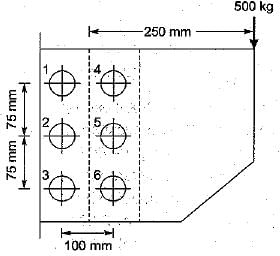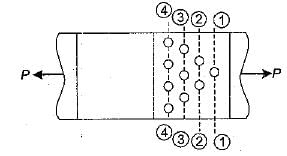Structural Fasteners - 3 - Civil Engineering (CE) MCQ
20 Questions MCQ Test - Structural Fasteners - 3
A structural member carrying a pull of 700 kN is connected to a gusset plate using rivets of 20 mm diameter. If the pull required for shearing the rivets, to crush the rivets and to tear the plate per pitch length are 60 kN, 35 kN and 70 kN respectively, then the number of rivets required is
| 1 Crore+ students have signed up on EduRev. Have you? Download the App |
When load line coincides with the C.G. of rivet group, then the rivets are subjected to
Which of the following is in violation of assumptions made in riveted joint analysis
If the same number of rivets has been used in the joints then which of the following pattern will yield highest efficiency
The effective length of a fillet weld of length L and size s is given by
The overlap of batten plates with the main members in welded connections should be more than (where t = thickness of batten plate)
For a standard 45° fillet weld the ratio of size of fillet to throat thickness is
The common assumption that, ‘all rivets share equally a non-eccentric load’ is valid at a load
By providing sufficient edge distance, which of the following failures of riveted joint can be avoided?
As per IS : 800, the rivets subjected to combined tensile and shear stresses are proportioned such that
(Where fs and ft are respectively actual shear and tensile stresses in a rivet and ps and pt are respectively permissible shear and tensile stresses in rivet.)
In a diamond riveting, for a plate of width 'b' and rivet diameter 'd', the efficiency of the joint is given by
Which of the following methods of design would be suitable for metal structures subjected to stress reversals and impact?
1. Simple working stress design
2. Rigid plastic design
3. Semirigid design
4. Elastic rigid design
Select the correct answer using the codes given below:
For rivets in tension with countersunk heads, the tensile value shall be
When two plates are placed end to end and are joined by two cover plates the joint is known is
Match List - l (Use) with List - ll (Type of weld) and select the correct answer using the codes given below the lists:
List - l
A. Structural members subject to direct tension or compression
B. Joining two surfaces approximately at right angIes to each other
C. A hole is made in one of the components and welding is done around the periphery of the hole.
D. Pressure is applied continuously
List - ll
1. Slot weld
2. Seam weld
3. Filletweld
4. Plug weld
5. Buttweld
Consider the following statements:
Aluminum is being increasingly used for structural purposes because
1. Its modulus of elasticity is double that of steel
2. Its coefficient of thermal expansion is half that of steel
3. It requires less maintenance
4. The strength to unit weight ratio of aluminum is high
Which of these statements are correct?
The rivets in an eccentrically loaded riveted joint are shown in figure below.

Which rivets will be stressed to maximum?




















